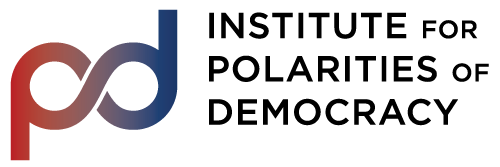(Portions of the text below is taken from an article by William Benet, PhD, Suzanne Rackl, MM, CFRE, CFRM and Cliff Kayser, MSHR, MSOD, PCC)
In 2017, the Institute for Polarities of Democracy was established as a Washington, DC-based nonprofit organization to promote and advance the Polarity Thinking theory of Dr. Barry Johnson and the Polarities of Democracy theory of Dr. Bill Benet. The Institute’s mission of positive social change is to train and educate scholars, researchers, and practitioners in educational and societal settings in using Polarity Thinking and Polarities of Democracy tools and processes to advance organizational well-being and to create healthy, sustainable, and just communities in the United States and internationally.
The Polarities of Democracy theory (Benet, 2006, 2012, 2013) promotes participatory practices that allow citizens, workers, families, organizations, and communities to unleash their creativity and strengthen their capacity for both research and social change initiatives that promote social and environmental justice and responsibility. It is a unifying theory with practical applications for advancing democratic workplaces and society. The theory’s ten non-partisan democratic values in their five polarity pairs are:
- Freedom and authority;
- Justice and due process;
- Diversity and equality;
- Human rights and communal obligations; and
- Participation and representation.
The Polarities of Democracy theory uses Dr. Johnson’s (1992, 2020) polarity thinking concepts to show how the energy system of interdependent pairs works over time in an ongoing pattern of shifting from one pole of a polarity to the other. Often, dysfunction in this natural dynamic occurs when “or” thinking—either this pole “or” that pole, assuming the two cannot coexist–is applied to interdependent pair polarities as a “solution” to the tension. This misdiagnosis of a polarity as a solvable problem requiring “both/and” thinking interrupts the flow of energy creating vicious cycles and escalating dysfunction. As the downside of an overemphasized pole becomes stronger, oppositional forces—coming similarly, from an “either/or” thinking perspective—begin to push for the benefits of the opposite pole because they tend to see only the positive aspects of that pole. Those who resist those changes see only the positive aspects of the current pole’s values that they defend and fear the negative results of the pole that could result from those advocating for change. These negative and dysfunctional vicious cycles are avoidable. The dynamic energies can be leveraged to promote well-being, the benefits of which can be sustained.
Along with the ten elements identified for the Polarities of Democracy theory, additional key findings suggested by Dr. Benet’s research include:
- The concepts of democracy arose from our emerging consciousness as part of our evolutionary development and the fundamental purpose of these is to overcome oppression,
- The principles of democracy have universal applicability to all cultures and time periods,
- The predominant Western philosophy of utility ignores the role that human altruism plays in our evolutionary (and democratic) development,
- Our societal origins provided a more democratic relationship between men and women than the patriarchal societies that have dominated modern history,
- These patriarchal societies have prevented us from attaining a full expression of democracy on a national or global level, and
- If true democracy is to be attained, then these ten polarity elements must be leveraged effectively in order to maximize the positive aspects of each element while minimizing the negative aspects of each element (Benet, 2006, 2012).
Among the primary objectives and purposes of the Institute are:
- To promote the Polarities of Democracy as developed by Dr. Benet as a theoretical framework for progressive social change initiatives that build healthy, sustainable, and just organizations and communities;
- To promote Polarity Thinking concepts as developed by Dr. Johnson as the foundational conceptual framework underlying the Polarities of Democracy theory;
- To articulate, communicate and disseminate the fundamental values underlying our democratic republic, which are necessary to its survival;
- To be intentional about using Polarities of Democracy and Polarity Thinking to interrupt the abuse of power and privilege anywhere it might occur; and
- To seek diversity in our board, staff, and partnering relationships and empower and leverage that diversity in support of the above objectives and purposes.
The Institute’s programs and activities range from resources, training, and research to consulting, evaluation, and applied social change projects. The Institute is investing in change and creating impact. Its first two years were dedicated to creating tools and providing scholarships and training to post-doctoral Fellows, and future seasons will bring a broad spectrum of additional resources, initiatives, training, and partnerships—all dedicated to improving quality of life and strengthening democratic principles.
Investing in Change
- Learning: The Institute has welcomed two cohorts of scholars and practitioners to our Social Change Fellows Ranks in its first three years. These sixteen post-doctoral Fellows are deepening their understanding of polarity approaches and polarities of democracy theory and are already using their new learning in their writing, work, and dialogue for social change challenges and opportunities. As a result of this growing body of social change work, the Walden University Library has created the Polarities of Democracy collection. This is the first collection created under the banner of the Social Change Collection, which houses scholarly output of the Walden University community in order to generate, conserve, and transform knowledge to improve human and social conditions.
- Empowerment: In 2019, the Institute established the Desi Benet Social Change Fellow Scholarship to be awarded to a woman PhD social change agent in each Fellows cohort memorializing the earliest supporter and champion of the Polarities of Democracy theory.
- Teaching: The Institute’s Leadership and Fellows have developed a strong cadre of tools and resources including study guides, video courses, assessment training, maps, and writings that are available to students, researchers, trainers, and the wider learning community.
Creating Impact
- Action: The Institute has launched six positive social change projects located in community-based settings. These projects focus on leveraging the theory’s non-partisan democratic values to strengthen organizations and communities working on issues ranging from economic revitalization to protecting voter’s rights.
- Leadership: With the myriad of resources, researchers, and social change agents in place, the Institute launched consulting services in 2020 along with dialogue and direct-action seminars. It also supported the launch of Dr. Barry Johnson’s new polarities thinking book, which highlights the role of polarities across a spectrum of issues.
- Partnerships: The Institute continues to develop strategic partnerships within higher education institutions, social change organizations, charitable entities, NGOs, philanthropic organizations, colleagues, and activists. It also partners with leaders from national and international organizations to support and extend the reach and use of Polarities of Democracy theory as a tool for their work in social change and advancing democracy.
The Movement
The Institute has major practice hubs of fellows and colleagues in Washington D.C., Toronto, Canada, and London, England. In addition to our hub communities there are multiple completed and in-progress research projects from the U.S., Europe, and Africa. Social change projects are currently underway in Zambia, Nigeria, and in the U.S. in California, Florida, Maryland, New York, South Carolina, and Virginia. The Institute also hosts a virtual learning community that currently includes colleagues and doctoral students across five continents. The Polarities of Democracy theory is being used to help people across disciplines, issues, and boundaries on campuses and in communities—in the classroom, the policy room, and in the boardroom.
Goals
Future Institute goals include long-term activism and resource training and sharing in the social justice arena. Through the Polarities of Democracy’ theory’s alignment with the United Nation’s Sustainable Development Goals, the Institute and its partners are working in the areas of ending poverty, increasing health and well-being, reduced inequalities, and creating sustainable cities and communities. Additionally, the Institute has a strong cadre of expertise around the UN’s Sustainable Development Goal of peace, justice, and strong institutions, with particular expertise regarding peace and conflict mediation, anti-gun violence, counter-terrorism, and intelligence.
The impact of Institute programming will be an ongoing, vibrant organization that activists, researchers, organizations, policy makers, and marginalized groups or communities can turn to for real-world tools and support to advance their rights through leveraging positive elements of democratic values—freedom and authority; justice and due process; diversity and equality; human rights and communal obligations; and participation and representation.
The Institute is a scalable organization with scalable innovative initiatives and partners in place to become successful. The long-term result will be a disruption of oppressive forces that stymie human creativity and societal possibilities.
References
Blake, R. R., & Mouton, J. S. (1985). The managerial grid III. Houston, TX: Gulf publishing Company.
Benet, W. J. (2006). The polarity management model of workplace democracy (Doctoral dissertation, Ontario Institute for Studies in Education of the University of Toronto, Canada). Available from ProQuest Dissertations & Theses Global Full Text database, UMI Publishing. (Order No. NR15724)
Benet, W. J. (2012). The polarities of democracy: A theoretical framework for building a healthy, sustainable, and just world. Unpublished Manuscript. Social Economy Centre, Adult Education and Community Development Program of the Ontario Institute for Studies in Education of the University of Toronto, Canada.
Benet, W. J. (2013). Managing the polarities of democracy: A theoretical framework for positive social change. Journal of Social Change 5(1), 26-39. doi:10.5590/JOSC.2013.05.1.03
Butts, R. F. (1980). The revival of civic learning. Bloomington, IN: Phi Delta Kappa Educational Foundation.
Johnson, B. (1992). Polarity management. Amherst, MA: HRD Press.
Johnson, B (2002). And: Making A Difference by Leveraging Polarities, Paradox or Dilemma. Amherst,
MA: HRD Press.





